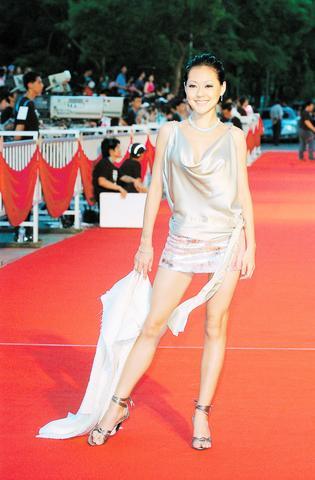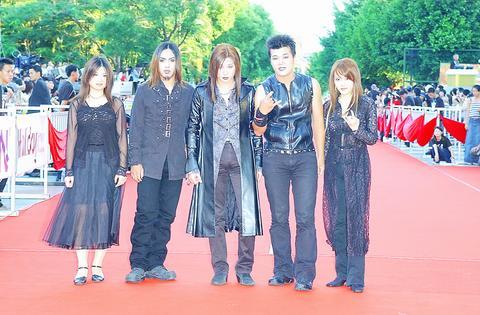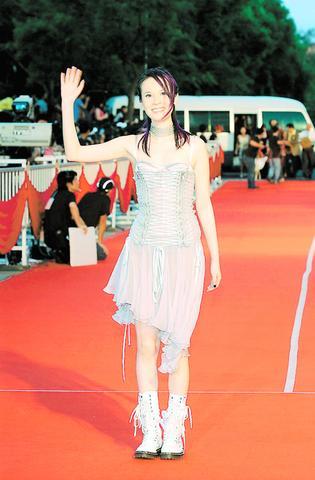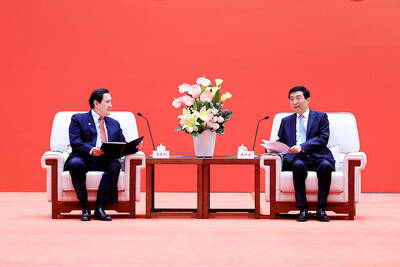Anyone who's anyone in Mando-pop was in Taipei last Saturday for the 14th Golden Melody Awards -- the music industry's annual orgy of self-congratulation that claims to recognize the best Chinese-language music released over the past year. Whatever the event's purpose, it's a convenient excuse for the whole pantheon of Chinese music celebrities to dress up to the nines and high-five each other all night.
Pop Stop showed up early for the red carpet extravaganza and, as in years past, this was probably the most exciting part of the show because of the thousands of screaming fans crushing the barricades for a view of their idols. Of course, the clothes worn by the stars is what generates most of the hoopla and this year there were good reasons to blush, drool and reach for a doggie bag.

Judging from the reactions in the post-event fashion analyses of local papers and with Pop Stop's complete concurrence, Little S (

It was also impossible not to notice that the ladies this year were showing more flesh than in recent memory.
As for the men, it seemed like they had collectively raided Pablo Escobar's wardrobe, cleaning it out of all its white double-breasted suits. Jay Chou (

But being one of only a handful of presentably dressed men at the show wasn't enough to earn Jay an award. After cleaning house last year at the Golden Melodies by taking the best songwriter, best producer and best album awards, he came up empty this year and has since been quoted in papers whining about the "unfair" judge panel.

Harsh words have also been directed at the judge panel by the three nominees of the best male Taiwanese singer award: Tsai Hsiao-hu (
The dignified losers of the night were A-mei (
The only surprise winners of the night were Goth rockers Chthonic (

The canonical shot of an East Asian city is a night skyline studded with towering apartment and office buildings, bright with neon and plastic signage, a landscape of energy and modernity. Another classic image is the same city seen from above, in which identical apartment towers march across the city, spilling out over nearby geography, like stylized soldiers colonizing new territory in a board game. Densely populated dynamic conurbations of money, technological innovation and convenience, it is hard to see the cities of East Asia as what they truly are: necropolises. Why is this? The East Asian development model, with

Desperate dads meet in car parks to exchange packets; exhausted parents slip it into their kids’ drinks; families wait months for prescriptions buy it “off label.” But is it worth the risk? “The first time I gave him a gummy, I thought, ‘Oh my God, have I killed him?’ He just passed out in front of the TV. That never happens.” Jen remembers giving her son, David, six, melatonin to help him sleep. She got them from a friend, a pediatrician who gave them to her own child. “It was sort of hilarious. She had half a tub of gummies,

The wide-screen spectacle of Formula One gets a gleaming, rip-roaring workout in Joseph Kosinski’s F1, a fine-tuned machine of a movie that, in its most riveting racing scenes, approaches a kind of high-speed splendor. Kosinski, who last endeavored to put moviegoers in the seat of a fighter jet in Top Gun: Maverick, has moved to the open cockpits of Formula One with much the same affection, if not outright need, for speed. A lot of the same team is back. Jerry Bruckheimer produces. Ehren Kruger, a co-writer on Maverick, takes sole credit here. Hans Zimmer, a co-composer previously, supplies the thumping

There is an old British curse, “may you live in interesting times,” passed off as ancient Chinese wisdom to make it sound more exotic and profound. We are living in interesting times. From US President Donald Trump’s decision on American tariffs, to how the recalls will play out, to uncertainty about how events are evolving in China, we can do nothing more than wait with bated breath. At the cusp of potentially momentous change, it is a good time to take stock of the current state of Taiwan’s political parties. As things stand, all three major parties are struggling. For our examination of the